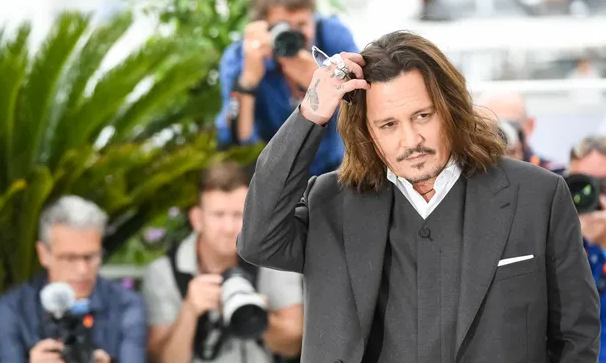Return of Johnny Depp to Cannes Highlights French Division Over. After US film companies dismissed Johnny Depp during two trials over alleged domestic abuse, it was evident that France was doing more than any other nation to rehabilitate the actor when he stepped on the red carpet at the Cannes film festival this week.
Over a hundred French actors and feminist organizations cried out against the festival, stating that Depp’s presence was emblematic of a systemic issue in which the French establishment shields individuals accused of sexual misconduct. “We are deeply outraged and refuse to remain silent in the face of the toxic politics espoused by the Cannes film festival,” performers declared in an open statement published in Libération.
Read more: The audience at Cannes gave Johnny Depp’s film a standing ovation that lasted for minutes.
Depp, who called the charges against him “abstract whispers” and claimed he “no longer needed Hollywood” at Cannes, has decided to base his cinematic comeback in France. His first film role in three years is as King Louis XV in Jeanne du Barry, in which he speaks French, and he is currently in France trying to secure financing for his next film as director, a feature on the artist Amedeo Modigliani set in the city of love.
French luxury label Dior was pleased that sales of its men’s fragrance, Dior Sauvage, had increased despite the two trials (one for libel and one for defamation) over alleged violent abuse against his ex-wife Amber Heard, gave Depp a record $20 million deal to continue advertising the fragrance.
Ads for Jeanne du Barry, which premiered in France this week but have yet to be released in the United States, featured Depp’s face on billboards, metro stations, and buses throughout Paris.
Depp, who has two daughters with French actress Vanessa Paradis, has remarked that France “feels like home” because of his previous residence there.
In 2020, a British court determined that labeling Depp a “wife beater” in the Sun newspaper did not constitute libel since the judge found that the article was “substantially true” and that 12 of the 14 assaults Heard claimed to have had were confirmed. The following year, in the United States, Depp filed a libel suit against Heard for an editorial she wrote for the Washington Post. A Virginia jury awarded him over $10 million on three counts and gave Heard $2 million on one.
Protesters against the festival put banners on walls in Nice, a coastal city near Cannes. One sign simply said, “Festival of rapists, misogynists, and arseholes.”
The tension at the festival was palpable. Jeanne du Barry’s co-star and director Mawenn claimed she cast Johnny Depp before the trials began.
Investigative website Mediapart’s editor-in-chief, Edwy Plenel, has filed a formal complaint against Mawenn for spitting on him earlier this year. According to what he told Variety, Mawenn was “outspokenly anti-#MeToo” and that she had singled him out because of Mediapart’s reporting on sexual assault charges in the film industry, including those made against her ex-husband Luc Besson, who has rejected all allegations. Mawenn told the media that she had no regrets about what happened with Plenel.
After hearing stories of sexual assault, bullying, and racism from their peers, French actor Ariane Labed and Franco-British actor Olivia Ross wrote an open letter signed by 123 actors warning against a French film business backing abusers.
Ross stated, “The #MeToo movement has had an impact, things are slowly shifting, but the Cannes film festival choosing these decisions is a clear smack in the face and a clear declaration of: ‘We’re not interested in that change.’ That’s how we take it, and it’s unacceptable.
France is often considered a place that emphasizes the “auteur” and constantly works to “decouple” art from its creators. That’s useful sometimes, but it should be something other than routine. We aimed to convey, “We French do not support these policies.”
They also wanted to show their solidarity with Portrait of a Lady on Fire’s Adèle Haenel, who recently revealed she was leaving the business due to the “general complacency” towards sexual predators.
According to Labed, “We wanted to stand with her, to say: we understand and share her anger, and we want to be heard.”
The feminist organization Osez Le Féminisme demanded a boycott of Cannes because France had a history of supporting men like Roman Polanski. The director, born in Poland but raised in the United States, evaded extradition to the United States by escaping to France in 1978 after confessing to the statutory rape of a 13-year-old girl.
According to the organization, the French film business was also called out for continuing to employ Gérard Depardieu. The actor was accused of rape in 2018, which he strongly rejects, and his lawyers have also recently refuted allegations of sexual misconduct made by 13 people.
Spokesman Ursula Le Menn said of Depp’s attendance at Cannes, “We’re once again seeing what has happened in the past, namely with Polanski, that this country welcomes with open arms, applauds, and celebrates men who are accused of being attackers.”
This, she asserted, stems from France’s “misogynist and patriarchal culture,” in which “male artists are put on a pedestal, and it is claimed that the art justifies everything.”









